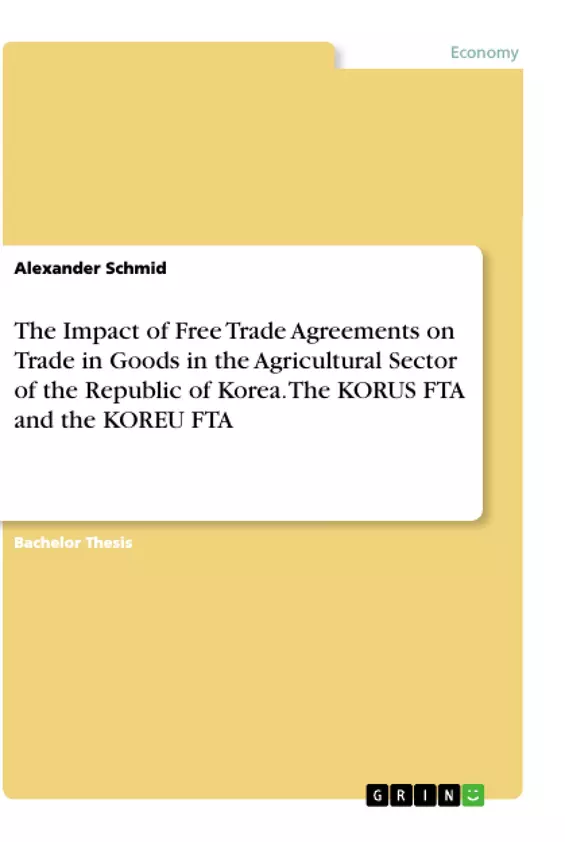Over the last twenty years South Korea has signed several free trade agreements, including one with the U.S. in 2007 and one with the E.U. in 2010, which include tariff reductions. This thesis examines the impact of tariff reductions through free trade agreements on the value of imports of a single product representative for the agricultural sector through several regression analyses using a Poisson pseudo maximum likelihood estimator.
Besides the two exporters of interest, the European Union and the United States, Canada, Mexico, Chile and Australia complement the data set as reference value. This study starts with a literature review on existing literature on the two free trade agreements and the effects of free trade on the agricultural economy. In chapter three an independent investigation is conducted explaining the background to the two free trade agreements and, more generally, the effects of trade liberalization on the agricultural sector. The following chapter describes the course of the investigation with the explanation of the operational variables and the data using descriptive statistics. The data is used in an estimation model to evaluate the effect of a reduction of tariff rates according to an agreement on the value of imports. The individual components of the estimation model are explained in more detail, followed by a presentation of the results of the estimation using the STATA statistics program. The last chapter concludes the whole investigation, together with considerations on possible further studies of this topic.
Inhaltsverzeichnis (Table of Contents)
- Introduction.
- Literature Review.
- Background
- KORUS FTA.
- KOREU FTA
- Impacts of Free Trade Agreements on Korea's Agricultural Sector.
- Data Description
- Definition of Operational Variables..........\li>
- Descriptive Statistics
- Empirical Model
- Poisson Pseudo Maximum Likelihood estimator...
- Fixed Effects..
- Results...
- Conclusion.
Zielsetzung und Themenschwerpunkte (Objectives and Key Themes)
This thesis investigates the impact of the KORUS FTA and the KOREU FTA on the value of agricultural imports in South Korea. Specifically, it examines whether these agreements, which included tariff reductions, led to an increase in imports of pork (HS-Code: 020319) - a product whose consumption is linked to income growth and macroeconomic uncertainty. The study employs several regression analyses using a Poisson pseudo maximum likelihood estimator to assess the impact of tariff reductions.
- The impact of free trade agreements (FTAs) on agricultural trade in South Korea.
- The role of tariff reductions in promoting agricultural imports.
- The application of the Poisson pseudo maximum likelihood estimator to analyze agricultural trade data.
- The influence of macroeconomic factors on pork consumption and imports.
Zusammenfassung der Kapitel (Chapter Summaries)
- Introduction: This chapter provides an overview of trade liberalization, highlighting the growth of regional and bilateral agreements, and emphasizing South Korea's significant economic development. It also discusses the importance of FTAs in promoting multilateral trade and the specific case of the KORUS and KOREU agreements.
- Literature Review: This chapter provides a comprehensive review of existing research on FTAs, their effects on agricultural economies, and the specific impact of the KORUS and KOREU agreements on agricultural imports in South Korea.
- Background: This chapter explains the background of the KORUS and KOREU FTAs, including the motivations for signing them and their specific provisions related to agricultural tariffs. It also discusses the broader context of trade liberalization and its impact on the South Korean agricultural sector.
- Data Description: This chapter presents a detailed description of the data used in the study, including the definition of operational variables and the source of the data. It also provides descriptive statistics summarizing key variables related to agricultural imports and tariffs.
- Empirical Model: This chapter presents the empirical model used to analyze the data, focusing on the Poisson pseudo maximum likelihood estimator and the inclusion of fixed effects. It explains the rationale behind the choice of this model and its suitability for analyzing agricultural trade data.
- Results: This chapter presents the results of the regression analyses, discussing the impact of tariff reductions on agricultural imports and examining the significance of other factors influencing trade flows.
Schlüsselwörter (Keywords)
This thesis focuses on the key concepts of trade liberalization, free trade agreements, agricultural imports, tariff reductions, South Korea, KORUS FTA, KOREU FTA, Poisson pseudo maximum likelihood estimator, and macroeconomic factors. It examines the impact of FTAs on agricultural trade in South Korea, using data on pork imports to assess the effectiveness of tariff reductions in promoting trade.
Frequently Asked Questions
What is the main objective of this thesis on South Korean trade?
The thesis investigates the impact of the KORUS (US) and KOREU (EU) Free Trade Agreements on the value of agricultural imports in the Republic of Korea.
Which specific agricultural product is used as a case study?
The research focuses on the import of pork (HS-Code: 020319) as a representative product for the agricultural sector.
What statistical methodology is applied in the study?
The study employs several regression analyses using a Poisson pseudo maximum likelihood (PPML) estimator to evaluate the effect of tariff reductions.
Which countries are included in the data set as reference values?
Besides the EU and the US, the data set includes Canada, Mexico, Chile, and Australia for comparison.
How did the FTAs impact agricultural tariffs?
The KORUS and KOREU agreements included significant tariff reductions aimed at liberalizing trade between the regions and South Korea.
What macroeconomic factors influence pork consumption in Korea?
The consumption and import values are linked to factors such as income growth and macroeconomic uncertainty within the South Korean market.
- Quote paper
- Alexander Schmid (Author), 2020, The Impact of Free Trade Agreements on Trade in Goods in the Agricultural Sector of the Republic of Korea. The KORUS FTA and the KOREU FTA, Munich, GRIN Verlag, https://www.grin.com/document/974672



